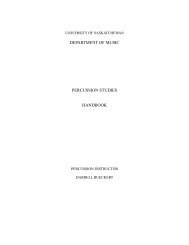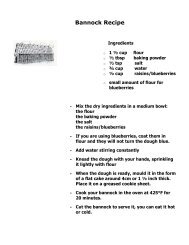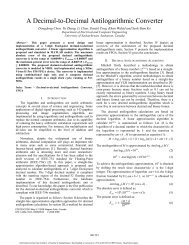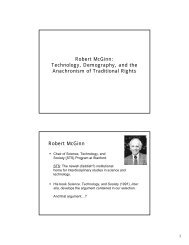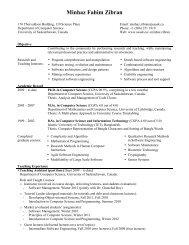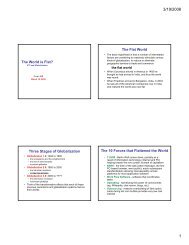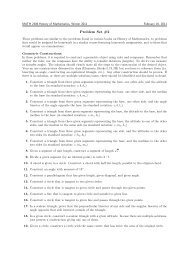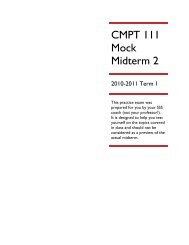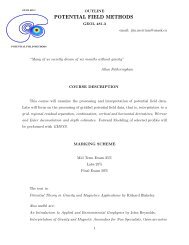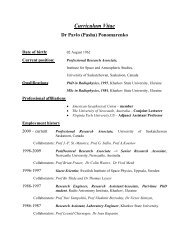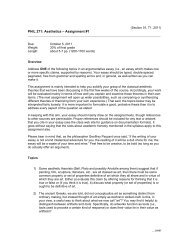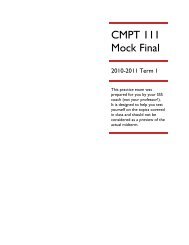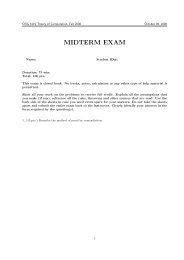Water Resources Engineering - Homepage Usask
Water Resources Engineering - Homepage Usask
Water Resources Engineering - Homepage Usask
You also want an ePaper? Increase the reach of your titles
YUMPU automatically turns print PDFs into web optimized ePapers that Google loves.
G10. PLANNING, OPERATION AND MANAGEMENT OF IRRIGATION SYSTEMS<br />
(KUL-code: I717(Th); I893 (Pr))<br />
Lecturer: RAES D.<br />
ECTS-credit: 5 pts<br />
Contact hours: 30 hrs. of theory/30 hrs. of practical<br />
Prerequisites: Irrigation agronomy (C8)<br />
Time and place: 1st semester, 13 sessions of 3 hours each, K.U.Leuven<br />
Course syllabus: Lecture notes<br />
Evaluation: Quotation on sample problems<br />
Comparable handbook: FAO Irrigation and Drainage Papers (Rome, Italy):<br />
N° 33 (1979) - Yield response to water. 193 p.<br />
N° 40 (1982) - Organization, operation and maintenance of irrigation schemes. 166 p.<br />
N° 45 (1989) - Guidelines for designing and evaluating surface irrigation systems. 137 p.<br />
N° 46 (1992) - CROPWAT, A computer program for irrigation planning and management.<br />
126 p.<br />
N° 56 (1998) - Crop Evapotranspiration. Guidelines for computing crop water<br />
requirements. 300 p.<br />
Additional information: The course consists of a number of theoretical classes and a set of practical real-live<br />
problems that the students have to solve (examination).<br />
Teaching is in English<br />
Learning objectives:<br />
The aim of the course is to provide techniques and calculation procedures for achieving optimal and efficient<br />
operation and management of irrigation systems. During practical sessions the students receive training in the<br />
use of software packages that are helpful for the development of irrigation plans and for the management of<br />
multicrop systems and rice schemes. At the end of the course the students should be able to optimize and<br />
manage the water supply for irrigation schemes.<br />
Course description:<br />
1. Planning of irrigation systems (Why develop irrigated agriculture? Development stages).<br />
2. Management of irrigation systems (Operation, maintenance and assistance services; Associations of<br />
irrigation water users).<br />
3. Planning water supply (Estimating future water supply and water demand; Setting up rotation delivery<br />
schedules. Planning water supply for flooded rice).<br />
4. Distribution of water (<strong>Water</strong> distribution methods; <strong>Water</strong> delivery control systems; Principles of the<br />
operation of hydraulic structures).<br />
5. Measures to match supply and demand (Reduction of the water deficit; Use of unconventional water<br />
sources; Optimization of the water allocation).<br />
6. Monitoring the water supply and performance of the system.<br />
The practical exercises aim to train the students in the development of irrigation plans for multiple cropping<br />
systems and rice schemes. Charts for guiding irrigation in real time in response to actual weather and water<br />
limiting conditions have to be worked out as well. The following software packages are used in the practical<br />
sessions:<br />
- IRSIS: Irrigation scheduling information systems (K.U.Leuven).<br />
- CROPWAT: (FAO)<br />
- BUDGET: a soil water and salt balance model (K.U.Leuven)<br />
- BIRIZ: water requirements for rice schemes (K.U.Leuven)<br />
- SIMIS: scheme irrigation management information system (FAO)<br />
Advanced studies in <strong>Water</strong> <strong>Resources</strong> <strong>Engineering</strong> / 39



